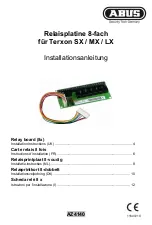
- 3 -
• Ne pas commuter de faibles intensités
par des contacts ayant au préalable
commutés des intensités plus élevées.
• Utiliser uniquement des fils de câblage en
cuivre 60/75 °C.
• Respectez les données indiquées dans les
caractéristiques techniques.
Mise en oeuvre :
• Amener la tension d'alimentation à travers
le poussoir AU sur les bornes A1 (+) et
A2 (-) :
câblez le contact du poussoir AU entre les
bornes A1 du PNOZ X1 et le potentiel (L+)
de la tension d'alimentation.
Relier la borne A2 du PNOZ X1 au
potentiel (-) de la tension d'alimentation.
La LED "Power" s'allume.
• Boucle de retour avec réarmement auto. :
pont entre Y1-Y2 ou câblage des
contacts externes.
• Boucle de retour avec réarmement manu:
branchement d'un poussoir entre les
bornes Y1-Y2, en série le cas échéant
avec les contacts externes.
Les contacts de sécurité sont fermés, le
contact d'info est ouvert. Les LEDs "CH1" et
"CH2" sont allumées.
Si le circuit d'entrée est ouvert (AU
actionné), les contacts 13-14/23-24/33-34
s'ouvrent et le contact d'info se ferme.
Remise en route :
• fermer le circuit d'entrée
• en cas de réarmement manuel, appuyer
sur le poussoir Y1-Y2.
• Keine kleinen Ströme mit Kontakten
schalten, über die zuvor große Ströme
geführt wurden.
• Leitungsmaterial aus Kupferdraht mit einer
Temperaturbeständigkeit von
60/75 °C verwenden
• Angaben im Kapitel "Technische Daten"
unbedingt einhalten.
Ablauf:
• Versorgungsspannung über NOT-AUS-
Taster an Klemmen A1 (+) und A2 (-)
anlegen:
NOT-AUS-Taster zwischen Klemme A1
des PNOZ X1 und die Plusklemme (L+)
der Versorgungsspannung anschließen.
Geerdete Seite der Versorgungsspannung
mit A2 verbinden. Die LED "Power"
leuchtet.
• Rückführkreis mit automatischem Start:
Brücke oder externe Schütze an Y1-Y2
anschließen.
• Rückführkreis mit manuellem Start:
Starttaster an Y1-Y2 und, wenn ge-
wünscht, externe Schütze in Reihe
schalten.
Die Sicherheitskontakte sind geschlossen,
der Hilfskontakt geöffnet. Die LEDs "CH1"
und "CH2" leuchten. Das Gerät ist betriebs-
bereit. Der Starttaster kann wieder geöffnet
werden.
Wird der Eingangskreis geöffnet (NOT-AUS-
Taster betätigt), öffnen die Sicherheitskon-
takte 13-14/23-24/33-34 und der Hilfskontakt
41-42 schließt.
Wieder aktivieren
• Eingangskreis schließen.
• Bei manuellem Start zusätzlich Starttaster
betätigen.
• Low currents should not be switched
across contacts across which high
currents have previously been switched
• Use copper wire that can withstand 60/75 °C.
• Important details in the section "Technical
Data" should be noted and adhered to.
To operate:
• Supply operating voltage to terminals A1
(+) and A2 (-) via E-Stop Button:
Connect the E-Stop Button between
terminal A1 of the PNOZ X1 and the
positive terminal (L+) of the operating
voltage.
Connect terminal A2 with the earthed side
of the operating voltage.
• Feedback control loop, automatic reset:
Bridge Y1 - Y2 or connect external
contactors/relays.
• Feedback control loop, manual reset:
Connect reset button at Y1 - Y2 or connect
external contactors/relays in series with
the reset button.
The safety contacts are closed, the auxiliary
contact is opened. The LEDs "CH1" and
"CH2" are illuminated. The unit is ready for
operation. The reset button can be released.
If the input circuit is opened (E-Stop
activated), the safety contacts 13-14/23-24/
33-34 open and the auxiliary contact 41-42
closes.
Reactivation
• Close the input circuit.
• With manual reset, the reset button must
also be pressed.
14
K3
K4
13
Y1
Y2
K3
K4
1L1
1L2
U
B
(L+)
Y1
A1
Y2
S1
S3
Fig. 2: Eingangskreis einkanalig: NOT-AUS-
Beschaltung; manueller Start/Single channel
input circuit: Emergency Stop wiring; manual
reset/Commande par 1 canal : circuit AU,
avec réarmement manuel
Faults/Disturbances
• Short circuit: An electronic fuse causes the
output contacts to open. Once the cause of
the disturbance is removed and the rated
voltage is upheld, the unit is ready for
operation after 60 s.
• Faulty contact functions: In the case of
welded contacts, no further activation is
possible following an opening of the input
circuit.
Fehler - Störungen
• Kurzschluss: Eine elektronische Sicherung
bewirkt das Öffnen der Ausgangskontakte.
Nach Wegfall der Störungsursache und
bei Einhalten der Versorgungsspannung
ist das Gerät nach ca. 60 s wieder
betriebsbereit.
• Fehlfunktionen der Kontakte: Bei ver-
schweißten Kontakten ist nach Öffnen des
Eingangskreises keine neue Aktivierung
möglich.
Erreurs- Défaillances
• Court-circuit: Un fusible électronique
entraîne l'ouverture des contacts de sortie.
L'appareil est à nouveau prêt à fonctionner
env. 60 sec. après la disparition du défaut.
• Défaut d'un contact : en cas de collage
d'un contact après ouverture du circuit
d'entrée, un nouvel réarmement est
impossible.
S1/S2: NOT-AUS- bzw. Schutztürschalter/Emergency Stop Button, Safety Gate Limit Switch/Poussoir AU, détecteurs de position
S3:
Starttaster/Reset button/Poussoir de réarmement
Fig. 3: Eingangskreis einkanalig: NOT-AUS-
Beschaltung; automatischer Start/Single
channel input circuit: Emergency Stop wiring;
automatic reset/Commande par 1 canal :
circuit AU, avec réarmement automatique
Fig. 4: Anschlussbeispiel für externe Schütze/
Connection example for external Contactors,
relays/Branchement contacteurs externes
U
B
(L+)
Y1
A1
Y2
S1






























